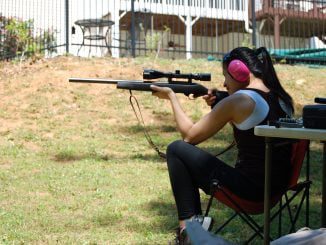
RALEIGH — More than a hundred concealed carry firearms instructors filled the meeting room to oppose three proposed rules by the North Carolina Department of Justice’s Criminal Justice Education and Training Standards Commission at the commission’s Aug. 9 meeting.
Commission Chair Leslie Desmukes noted the unusually large attendance in her opening remarks to the meeting. In addition to chairing the commission, Desmukes is the criminal bureau chief at the N.C. Department of Justice and was featured in a March 2023 tweet by N.C. Attorney General Josh Stein highlighting Women’s History Month.
According to the original public notice on the NC DOJ’s Criminal Justice Education and Training Standards website, the amendments were being proposed for “Subchapter 09F-Section .0100 of the NC Administrative Code” which governs concealed carry training.
The public notice included three forms, a “pre-delivery report” and a “post-delivery report” of the training and a “concealed carry handgun student roster” form.
Under the administrative code for CHP training, instructors are already required to file a copy of the proposed firearms “course description, outline, and proof of instructor certification,” making the NCDOJ’s proposed forms seem duplicative.
The proposed changes were supposed to occur in the second half of the meeting, but the schedule was changed by Desmukes after an attendee asked the rule changes to be dealt with at the beginning of the meeting due to many people having driven hours and hundreds of miles to be there.
Desmukes told the attendees “some revisions” to the proposed rules had been made since first being posted online. She said the revisions made had “been based on discussions with the field, taking feedback from instructors,” and as the result of “negotiations” at a meeting with Grassroots NC and Republican legislator Rep. Keith Kidwell.
The changes included reducing the 30-day window to file the pre- and post-delivery reports down to seven days.
Desmukes noted the requirement of submitting student rosters was “changed significantly.” The original proposal would have required instructors to submit student names and emails. The revised proposal now would have those rosters kept by the instructor for 24 months and would only need to be produced “for inspection” with regard to an investigation or audit being conducted.
She also said the division would “destroy” the roster at the conclusion of an audit or investigation and that such rosters are not a public record.
In her remarks giving reasons for the forms being proposed, Desmukes said it was due to incidents where an instructor had sold certificates out of his truck and one had taught a course while allegedly intoxicated.
“We have had lots of recent allegations against instructors,” Desmukes said, later adding, “It can be dangerous for all citizens if instructors are not following the rules.”
Common themes among the more than 30 citizens who made public comments at the meeting included viewing the pre-and post-delivery forms as a time and cost burden as well as good instructors being punished for the actions of bad instructors.
Speakers also argued the pre-delivery form was unworkable and that many times training sessions are set up within a day or two, especially in the case of domestic violence victims with special orders to take training as immediately as possible.
At least half that gave comments pushed back on the idea of keeping a roster with some claiming it violated federal privacy laws by collecting Personally Identifiable Information, or PII.
Paul Valone, director of Grassroots North Carolina, the state’s largest firearms advocacy group, was one of those who spoke during the public comments portion of the meeting. He, along with most of the speakers, opposed all three of the proposed rule changes.
“We oppose anything that makes it more difficult to get a permit, including obstruction of training,” Valone said.
Valone also countered Desmukes’ earlier statements about the changes made to the proposed rules.
“Now, with respect to the meeting the other day with Rep. Kidwell, perhaps you misunderstood our position — we were not there to negotiate,” said Valone. “We were there to observe. And so consequently, although I appreciate you have reduced this pre-delivery report from 30 to seven days, that’s not enough.”
Valone went on to say the only thing his organization supported would be to make the pre- and post-delivery submitted electronically on an “as available basis” for instructors to have the flexibility needed to hold impromptu classes.
“The fact is that many people who take concealed carry classes don’t have any intention of getting a permit,” Valone said in opposition to the student roster proposal. “The state has no business having access to their names. None whatsoever. And, in fact, attorneys advise us that keeping this list, this roster may be an infringement of the 1st Amendment; freedom of association.”
Valone added that if the roster stays in place when this final rule is issued, “we will avail ourselves of North Carolina General Statute 150B- 21.3 and demand a legislative review.”
At least a third of those in attendance at the meeting were women, including Heather Allen, an instructor from Surf City who moved to North Carolina from California where she had also taught basic handgun lessons and worked for California Rifle Pistol Association.
“What scares me is that the Second Amendment in California is completely on life support. It’s been a slow death by a thousand cuts,” Allen told the commission. “So when I see these [proposed rule changes], my first question is what are the next infringements? What are the next rules?”
Rhonda Allen, an NRA-appointed training counselor, concealed carry instructor and the owner/manager of Armed Angels Training, spoke with North State Journal during a break in the meeting.
“It is just an oppressive rule,” Allen told North State Journal about the class size reporting form. “And I think the majority of the concealed carry gun instructors in this state are professional and have integrity, and we’re doing the job correctly and we don’t need to be punishing the majority for the few.”
She also said she doesn’t understand the “purpose or the point of getting just numbers only.”
“It’s just another erosion, you know, coming at it from a different point of view, and attack on our Second Amendment rights,” said Allen. “They attack the guns, they attack ammo, they attack classes, they attack everything to do with self-protection, and I’m here to fight back against that.”
When asked, Allen agreed the new rules would impact domestic violence victims who are mainly females.
“I do specialize in teaching females, especially at the state and national level, with Armed Women of America,” Allen said. “And there are a lot of instances of domestic violence victims, and they do need training and sometimes they need it very quickly. So we would not have the opportunity to give any prior notice and then therefore would be in violation of these onerous, oppressive, weak rules.
“In my opinion, they serve no purpose, and that’s why I see it as just a means of pushing out the small instructor — the less people that are teaching it, the less permits that will be issued, the less opportunity our citizens have to protect themselves. And I see this as an infringement on our rights.”
Another item repeated in multiple public comments was the cost of the “Red Book,” the concealed carry training manual produced by the state that instructors are required to use. Currently, the book costs $8.75 plus shipping and handling.
Several speakers requested that the book be digitized and made publicly available online for free. One of the speakers said they had asked for the state’s cost to print the book and was given an invoice showing a batch of 5,000 produced at a state prison at a cost of just $3.26 each.
The commission met again Aug. 11 and heard updates from the Planning and Standards Committee and approve continued work on the language in the delivery reports and student roster form. Following a brief vote on the matter, the commission said it would spend the coming months gathering information and having discussions with more stakeholders before taking any action at its next meeting in November.



